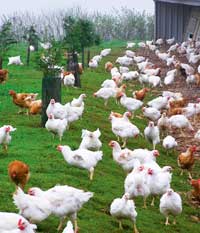Call to deplete laying flocks early

A co-ordinated, national strategy to deplete laying flocks early is needed to help reduce the surplus of eggs and restore a better balance to the market, according to British Free Range Egg Producers Association chairman John Retson.
Addressing a recent meeting of the Severn Valley Poultry Discussion Group near Ross-on-Wye, Mr Retson explained that the national laying flock was scheduled to reach almost 34m in October.
“That’s 4m birds more than we need and they’ll be laying well into the autumn of 2011. I think we need to take control and start to deplete early,” he said, suggesting that packers would have to play a co-ordinating role.
But one producer at the meeting said getting people to deplete even two-to-three weeks early would be difficult. “It is the back end of the cycle that you get the most profit. That is the period when you make your money to pay for the pullets,” he said.
Exactly who was to blame for the over-expansion of the laying flock and the subsequent drop in producer and wholesale prices was the subject of some heated debate.
Mr Retson estimated that the national free-range flock had reached 15m hens. “We always wanted to be at 15m in time for the cage ban in 2012, so we have hit that target two years early,” he said.
But the real expansion had come about because the cage egg sector had invested in new colony systems in preparation for 2012, but had also kept conventional cages at full capacity due to the good prices eggs had been making.
This was contested by Gareth Griffiths of Oakland Farm Eggs, who explained that he had already delayed the re-stocking of some of his sheds, and was not planning on converting any more until next October.
“I think the bulk of the extra birds are in the free-range sector,” he told the meeting, suggesting there were now more than 20m free-range hens in the country. Mr Griffiths agreed that steps should be taken to deplete early.
Director of the Central Egg Agency, Andrew Hignett, said the free-range egg market had been “way over done” and was in danger of losing its premium price over cage eggs.
Mr Retson said that, if this was the case, then the additional welfare standards offered by free range would be jeopardised. “We’ve got to think outside the box, or we’ll be in trouble.”
